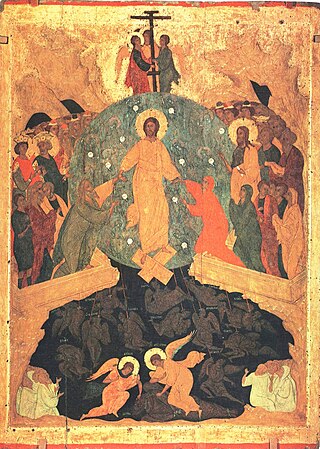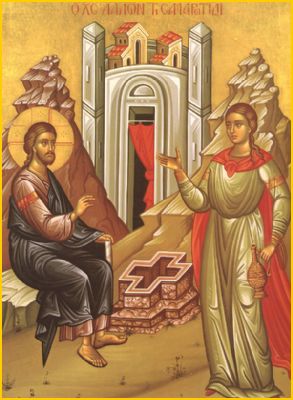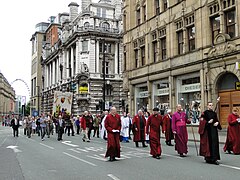
Easter, also called Pascha or Resurrection Sunday, is a Christian festival and cultural holiday commemorating the resurrection of Jesus from the dead, described in the New Testament as having occurred on the third day of his burial following his crucifixion by the Romans at Calvary c. 30 AD. It is the culmination of the Passion of Jesus Christ, preceded by Lent, a 40-day period of fasting, prayer, and penance.

Pentecost is a Christian holiday which takes place on the 50th day after Easter Sunday. It commemorates the descent of the Holy Spirit upon the Virgin Mary and the Apostles of Jesus Christ while they were in Jerusalem celebrating the Feast of Weeks, as described in the Acts of the Apostles.

Holy Week is the most sacred week in the liturgical year in Christianity. For all Christian traditions it is a moveable observance. In Eastern Christianity, which also calls it Great Week, it is the week following Great Lent and Lazarus Saturday, starting on the evening of Palm Sunday and concluding on the evening of Great Saturday. In Western Christianity, Holy Week is the sixth and last week of Lent, beginning with Palm Sunday and concluding on Holy Saturday.
These are the public holidays observed in Ireland. Public holidays in Ireland may commemorate a special day or other event, such as Saint Patrick's Day or Christmas Day. On public holidays, most businesses and schools close. Other services, for example, public transport, still operate but often with reduced schedules.
The Parish ale or church ale was a party or festivity in an English parish at which ale was the chief drink. It was typically a fundraising occasion for the parish that might include music and dancing. Very common in the later Middle Ages, parish ales encountered some opposition after the English Reformation, though some survived until modern times in some form.

Easter Monday is the second day of Easter and a public holiday in some countries. In Western Christianity it marks the second day of the Octave of Easter; in Eastern Christianity it marks the second day of Bright Week.

Whit Monday or Pentecost Monday, also known as Monday of the Holy Spirit, is the holiday celebrated the day after Pentecost, a moveable feast in the Christian liturgical calendar. It is moveable because it is determined by the date of Easter. In the Catholic Church, it is the Memorial of the Blessed Virgin Mary, Mother of the Church, marking the resumption of Ordinary Time.
The people of the Solomon Islands observe these holidays nationally.

Easter Saturday, on the Christian calendar, is the Saturday following the festival of Easter, the Saturday of Easter or Bright Week. In the liturgy of Western Christianity it is the last day of Easter Week, sometimes referred to as the Saturday of Easter Week or Saturday in Easter Week. In the liturgy of Eastern Christianity it is the last day of Bright Week, and called Bright Saturday, The Bright and Holy Septave Saturday of Easter Eve, or The Bright and Holy Septave Paschal Artos and Octoechoes Saturday of Iscariot's Byzantine Easter Eve. Easter Saturday is the day preceding the Second Sunday of Easter.

The Blickling homilies are a collection of anonymous homilies from Anglo-Saxon England. They are written in Old English, and were written down at some point before the end of the tenth century, making them one of the oldest collections of sermons to survive from medieval England, the other main witness being the Vercelli Book. Their name derives from Blickling Hall in Norfolk, which once housed them; the manuscript is now Princeton, Scheide Library, MS 71.

Whit Tuesday is the Christian holiday celebrated the day after Pentecost Monday, the third day of the week beginning on Pentecost. Pentecost is a movable feast in the Christian calendar dependent upon the date of Easter. "Whit" relates either to the white robes worn by those baptized on Pentecost, or to the French word "huit," since Pentecost is the eighth Sunday after Easter.

Green week, or the green holidays, is a traditional Slavic seasonal festival celebrated in early June. It is closely linked with the cult of the dead and the spring agricultural rites. In Eastern European villages, the seven weeks following Easter have historically been a time of festivity. Green week takes place during the seventh week leading up to the Pentecost, and includes the seventh Thursday after Easter, called Semik.

The Pentecostarion is the liturgical book used by the Eastern Orthodox and Byzantine Catholic churches during the Paschal Season which extends from Pascha (Easter) to the Sunday following All Saints Sunday.

Whit Friday, meaning "white Friday", is the name given to the first Friday after Pentecost or Whitsun.
In Sweden, public holidays are established by acts of Parliament. The official holidays can be divided into Christian and non-Christian holidays. The Christian holidays are jul (Christmas), trettondedag jul (Epiphany), påsk (Easter), Kristi himmelsfärds dag, pingstdagen (Pentecost), and alla helgons dag. The non-Christian holidays are: nyårsdagen, första maj, Sveriges nationaldag, and midsommar (Midsummer). Midsummer is, however, officially also a Christian holiday to celebrate John the Baptist's birthday.
The Easter cycle is the sequence of the seasons and days in the Christian liturgical year which are pegged to the date of Easter, either before or after it. In any given calendar year, the timing of events within the Easter cycle is dependent on the calculation of the date of Easter itself.
The holidays in The Bahamas include the following:

In southern Wales and nearby portions of England, Sul y Blodau or Flowering Sunday is a grave decoration tradition commonly observed on Palm Sunday, although historically Flowering Sunday grave decoration was also observed on other days as well. It is traditional to whitewash and decorate graves with flowers on Flowering Sunday. Today, the names Palm Sunday and Flowering Sunday are used interchangeably in Wales. Scholars Alan and Karen Jabbour have postulated that Flowering Sunday might be connected to Appalachian and Liberian Decoration Day cemetery traditions. Flowering Sunday is also known as Blossom Sunday in some portions of England.












